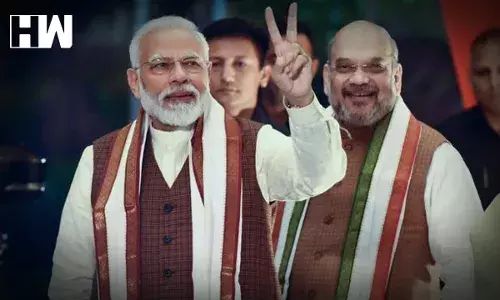New Delhi: Prime Minister Narendra Modi is now the model for what it means and takes to be a “national leader,” according to Home Minister Amit Shah, who claims that the designation was previously given to politicians with little track record and only capable of winning one or two safe Lok Sabha seats.
While national leaders were identified in the immediate aftermath of independence by their “name recall” across regions as a result of their participation in the freedom struggle, the expression was abused in later decades, particularly during the coalition era, he said, adding that Delhi media generously distributed the status to its “friends and favourites.”
In the book “Modi@20 Dreams Meet Delivery,” published by Rupa Publications and set to be released on May 11, Shah writes that such “facilitative and insincere manufacturing of national leaders” was exposed for what it was after Modi led the BJP to its largest Lok Sabha victory in 2014, then repeated the feat with a larger margin in 2019.
Shah, a longtime confidant of the prime minister, argued that “traveling to ordinary locations, meeting average families, sharing ordinary experiences, and doing all of this by ordinary ways” is the best instructor for a leader. “Narendra Modi has done so more frequently and persistently than any politician in the last 75 years,” he said, adding that there had been “no mandate for hope; and no mandate that was merely a reward for tested performance” before the 2014 and 2019 elections.
He claimed that parties and prime ministers won majorities in the Lok Sabha between 1952 and 1984 on the basis of the freedom movement’s goodwill, family legacy, anger against the incumbent (1977), a mix of fear and sympathy (1984) with appeasement, sectional prejudice, vote bank mobilization, and empty sloganeering like ‘Garibi Hatao’ of 1971.
Everyone now recognizes that the 2014 elections were the most significant upheaval in Indian politics’ history. Shah composed.
He stated Modi embraces state campaigns, issues, and idioms, citing his popularity as a crucial role in the BJP’s victory in state elections, particularly the last phase of five assembly elections.
“He’s not an afterthought or a mascot flown in for a few events and rallies.” He adds to the state BJP units’ and leaders’ profound awareness of local politics and concerns. This is in stark contrast to other parties’ ostensible national leaders. They arrive by plane,fly-out visitors with no sense of the ground reality,” the home minister said.
PM Modi has the “precious gift” of personal connection with every state and region, he added, noting that one must go back to his years before 2001 to understand it and to his “untiring Bharat Yatra of that period with a watchful eye, a listening ear and an open mind”. “That tapasya was his real-life university.” The prime minister’s experiential learning is his cognitive base, giving him an enormous understanding of the country as a bottom-up, rather than top-down, imposed-from-above and Delhi-centric, national leader, Shah said.
PM Modi’s measures as prime minister for distributing cooking gas cylinders among households and building toilets as part of the Swachh Bharat Mission stemmed from this understanding, he added.
Shah stated that his total dedication to the party’s expansion has not waned since reaching the top executive position, claiming that he has not traded party interests for tactical victories in the government, but rather views them as symbiotic.
PM Modi was the one who recommended him to use technology and start the BJP membership campaign on the basis of a missed call, Shah said, recalling the prime minister’s advice when he approached him about the exercise in 2015.
“In terms of membership numbers, the campaign made the BJP the largest party in any democracy. It galvanised our expansion into regions and among communities that had so far been harder to access,” he wrote.
The home minister concluded his chapter “Democracy, delivery and the politics of hope” in the book with an assertion that Modi is far from done. “The decade has just begun. Watch for where it takes Narendra Modi, where Modi takes the BJP, and where the BJP and Modi take India,” he said.
According to Rupa Publications, ‘Modi@20’ is an anthology edited and compiled by BlueKraft Digital Foundation, and is a collection of chapters authored by eminent intellectuals and domain experts. It aims to provide a definitive and expansive exploration into the fundamental transformation of Gujarat and India over the last 20 years due to Modi’s “unique model of governance.”
External Affairs Minister S Jaishankar, National Security Advisor Ajit Doval, cardiologist Devi Shetty, and Infosys co-founder Nandan Nilekani are among the book’s contributors.
As an independent media platform, we do not take advertisements from governments and corporate houses. It is you, our readers, who have supported us on our journey to do honest and unbiased journalism. Please contribute, so that we can continue to do the same in future.

